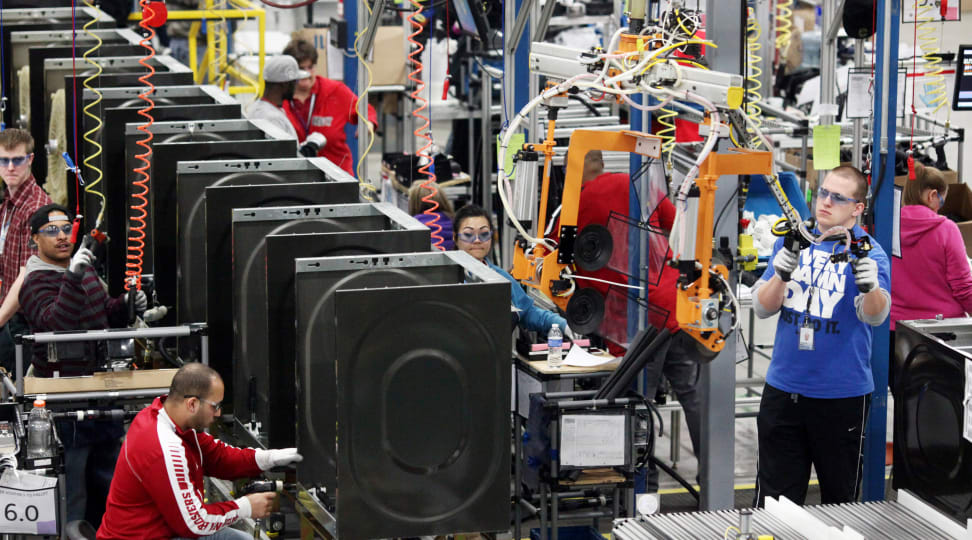What Will the Sale of GE Appliance Mean for Jobs?
The impact on employment may not be known for quite some time, as deal moves into the hands of regulators
 Credit:
Credit:
Products are chosen independently by our editors. Purchases made through our links may earn us a commission.
This article has been updated with new information.
The acquisition of GE’s appliance business by Swedish-based Electrolux AB represents the end of an era for the storied, all-American brand. It also leaves workers on both sides wondering what will happen to their jobs.
At this stage, all parties have clearly stated that the impact on jobs is not known and no cuts have been announced. The companies are thus far promoting the additive nature of combining the brands rather than job efficiencies.
Any word on jobs won’t come until regulators have had a chance to look at the deal and make recommendations on what should be done with the various holdings.
“We will work closely with our regulators,” stated an Electrolux spokesperson, “and we expect to receive approval in 2015.” The company also confirmed that they are filing the regulatory paperwork in the right jurisdictions so they can begin the process.
While nothing is certain about the future of the workforce at this time, there are overlaps between the two companies, and those are likely to be scrutinized for efficiency gains. Electrolux’s presentation to investors cited run-rate synergies of $300 million, primarily derived from sourcing and operations. Importantly, the company did not specify any synergies related to job cuts.
Both companies currently operate individual headquarters. However, the Charlotte Observer reports that the combined company headquarters will be based in Charlotte.
“Charlotte is the headquarters and will be the headquarters,” stated says Electrolux President and CEO Keith McLoughlin.
Based on the presentation to investors, Electrolux considers GE’s Appliance Park in Louisville, Kentucky to be a valuable asset. As such, it could become a manufacturing and logistics hub for Electrolux’s North American operations.
Later in the presentation, however, Electrolux references an “optimized manufacturing footprint,” which implies that the company may take a look at possible overlap in its factory holdings.
GE Appliance employs about 12,000 workers, half of which are located at GE’s historic, 900-acre Appliance Park in Kentucky. Other major factories are in LaFayette, Georgia and Bloomington, Indiana. But notably, some of those factories are state of the art: After failing to sell in 2008, GE invested over $1 billion into its appliance business, replacing aging equipment and training employees in new technology. Most of Electrolux’s research and development is done in Europe, while GE’s is mostly done on site at Appliance Park.
“GE Appliances is a well-run operation with strong capabilities in key areas such as R&D, engineering, supply chain, and customer service, and we look forward to joining forces with their team of talented and competent people,” says McLoughlin.

GE's Appliance Park in 1963. (Photo Credit: GE)
A modernized American factory and workforce are likely part of what made GE an attractive acquisition. Electrolux just opened its own brand-new oven factory in Memphis, Tennessee and operates other facilities in Anderson, South Carolina and St. Cloud, Minnesota.
While GE’s labor force is unionized and Electrolux’s is not, an industry insider not authorized to speak on record stated that this is unlikely to have a significant impact, as each company’s labor and production costs are similar.
With the GE appliance brands under its umbrella, Electrolux will rival Whirlpool Corp. as the largest appliance seller in the U.S.
A significant part of GE’s value lies in its infrastructure and distribution network, which the company has honed throughout a century of domestic growth. Also, GE’s reach into the U.S. builder market far outstrips that of Electrolux. With new construction on the rise, Electrolux has just bought its way into a new revenue channel.
This was no fire sale, however. According to Dinesh Kithany, senior analyst of home appliances at research firm HIS, GE took its time to find the best-fit buyer.
“Knowing GE, they are very particular about their brand,” Kithany states. “They need the consumers to be taken care of after this deal is signed in terms of warranties and all the after-sales service.”
Electrolux recorded approximately $15 billion in worldwide sales in 2013, with North American large appliance sales representing 29% of that total.
Of Electrolux’s 61,000 global employees, over 18% are based in the US—more than three times its workforce in Sweden. While GE has long marketed itself as the quintessential American brand, Electrolux has operated in the U.S. nearly as long. As early as 1933, Electrolux was operating in Connecticut, where it manufactured vacuums and refrigerators.
Prior to today’s announcement, Electrolux’s biggest expansion into America came in 1986, when it acquired the manufacturing for White Consolidated Industries, which sold under the Frigidaire, Westinghouse, and Kelvinator brand names.
Today’s announcement will no doubt leave many workers waiting for further news from their future employer.
[Hero image credit: GE]
